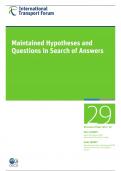Maintained Hypotheses and
Questions in Search of Answers
29
Discussion Paper 2011 • 29
Marc GAUDRY
Agora Jules Dupuit (AJD)
Université de Montréal, Canada
Émile QUINET
Paris-Jourdan Sciences Économiques (PSE)
École des Ponts Paris Tech (ENPC),
France
, This document was produced as a Background Paper for the Roundtable entitled:
Major Transport Infrastructure Projects and Regional Economic Development – Assessment
and Implementation, held in Paris on 1-2 December 2011.
The views expressed in this document are the authors’ and do not necessarily
reflect the opinions of the University of Montréal, the ENPC, Paris, or
the International Transport Forum.
Further information about the International Transport Forum is available at
www.internationaltransportforum.org
, Maintained Hypotheses and
Questions in Search of Answers
Discussion Paper No. 2011-29
Marc GAUDRY
Agora Jules Dupuit (AJD)
Université de Montréal
Canada
and
Émile QUINET
Paris-Jourdan Sciences Économiques (PSE)
École des Ponts ParisTech (ENPC)
France
[Revised February 2012]
, INTERNATIONAL TRANSPORT FORUM
The International Transport Forum at the OECD is an intergovernmental organisation
with 53 member countries. It acts as a strategic think tank with the objective of helping
shape the transport policy agenda on a global level and ensuring that it contributes to
economic growth, environmental protection, social inclusion and the preservation of
human life and well-being. The International Transport Forum organizes an annual
summit of Ministers along with leading representatives from industry, civil society and
academia.
The International Transport Forum was created under a Declaration issued by the
Council of Ministers of the ECMT (European Conference of Ministers of Transport) at its
Ministerial Session in May 2006 under the legal authority of the Protocol of the ECMT,
signed in Brussels on 17 October 1953, and legal instruments of the OECD.
The members of the Forum are: Albania, Armenia, Australia, Austria, Azerbaijan,
Belarus, Belgium, Bosnia-Herzegovina, Bulgaria, Canada, China, Croatia, the Czech
Republic, Denmark, Estonia, Finland, France, FYROM, Georgia, Germany, Greece,
Hungary, Iceland, India, Ireland, Italy, Japan, Korea, Latvia, Liechtenstein, Lithuania,
Luxembourg, Malta, Mexico, Moldova, Montenegro, Netherlands, New Zealand, Norway,
Poland, Portugal, Romania, Russia, Serbia, Slovakia, Slovenia, Spain, Sweden,
Switzerland, Turkey, Ukraine, the United Kingdom and the United States.
The International Transport Forum’s Research Centre gathers statistics and conducts
co-operative research programmes addressing all modes of transport. Its findings are
widely disseminated and support policymaking in member countries as well as
contributing to the annual Summit.
DISCUSSION PAPERS
The International Transport Forum’s Discussion Paper Series makes economic
research, commissioned or carried out at its Research Centre, available to researchers
and practitioners. The aim is to contribute to the understanding of the transport sector
and to provide inputs to transport policy design. The Discussion Papers are not edited by
the International Transport Forum and they reflect the author's opinions alone.
The Discussion Papers can be downloaded from
: www.internationaltransportforum.org/jtrc/DiscussionPapers/jtrcpapers.html
The International Transport Forum’s website is at: www.internationaltransportforum.org
or for further information on the Discussion Papers, please email: itf.contact@oecd.org




